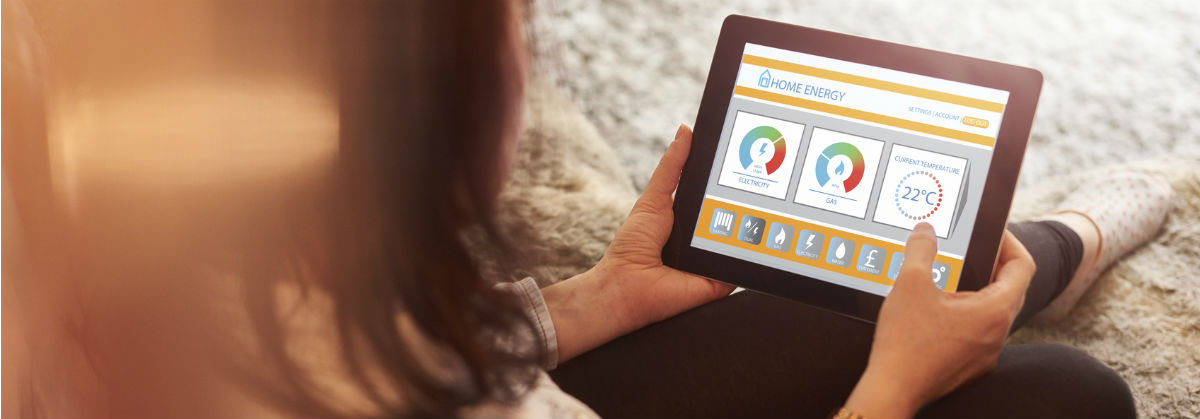On this page:
What is a smart meter?
A smart meter, also known as a digital meter or advanced meter, is a type of electricity meter that uses digital technology to record your exact energy usage.
Smart meters record your energy usage in kilowatt hours (kWh) every five to 30 minutes, sending the data to your energy retailer.
Smart meters look very similar to traditional energy meters, the only difference is that smart meters come with a digital display screen, rather than a dial.
What are the benefits of a smart meter?
There are numerous benefits to installing a smart meter, such as:
- Transparent billing: Because your energy provider can remotely access your smart meter data in real-time, you’ll be billed exactly for your energy usage.
- Access to live usage information: Some retailers may provide smart meter users with a mobile app or web portal to monitor their energy use. Customers can work out where they’re wasting electricity and how they can save money on future bills.
- Remote disconnection and connection: If you’re moving homes or switching providers, your smart meter can be turned on/off remotely without an on-site electrician — speeding up the process and making it cheaper.
- Flexible rate tariffs: Smart meter users have access to flexible energy pricing, such as a time of use tariff or controlled load tariffs.
- Rooftop solar: A smart meter is required if you’re interested in installing rooftop solar. It also opens you to the world of solar feed-in tariffs and net metering.
- Quicker response to connection issues: With live usage information available, smart meters can also notify electricity distributors of any connection issues as they emerge (e.g. power outages).
- Monthly billing: A smart meter gives you the option to opt for a monthly billing cycle (versus a quarterly one).
Do I need to install a smart meter?
Changes to the National Electricity Rules by the Australian Energy Market Commission (AEMC) mean that Aussies can no longer opt out of a smart meter installation.
If you’re still using a traditional electricity meter, your energy provider will notify you when they’re ready to proceed with a smart meter upgrade, which you’re no longer allowed to refuse.
However, there are protections in place to support you during the nationwide smart meter rollout:
- If your energy provider notifies you that they are ready to replace your old meter with a smart one, you cannot be charged any upfront costs for the smart meter and its installation.
- Your energy provider cannot change your current energy plan’s tariff without informed consent.
- You can request that your smart meter’s two-way communication system be switched off. However, you may be charged for manual meter reads instead.
- If you want to speed up your smart meter upgrade, you can contact your electricity provider. Keep in mind that this could attract an installation cost.
Smart meter installation
If your existing legacy meter breaks, or you’re moving into or building a new property that will connect to the grid, you’ll most likely be offered a smart meter by the retailer supplying electricity to your home. However, retailers are legally prohibited from charging you for the meter or the installation.
Traditional meter users can also request to upgrade their old meters ahead of time by contacting their electricity providers. However, this could incur a fee.
Smart meter eligibility
Not all smart meters are compatible with all homes and energy plans. It is important to confirm which smart meter will work for your home and energy provider before confirming your installation. Here are some things to consider:
- Whether the energy provider offers smart meters with an electricity plan.
- Whether a smart meter is mandatory for a product/service you’ve opted in for (eg. the installation of new solar panels and/or batteries).
- Whether smart meters have been widely rolled out in your area.
- Whether your existing meter is damaged or faulty and in need of replacement.
- Whether your home is a newly built property.
- Whether your home is part of an embedded electricity network (contact your embedded network operator for more information).
How do I request a smart meter installation?
- Contact energy providers: Find the most competitive price and if it is available near you.
- Ask about the costs involved: Find out if there are any installation fees or ongoing expenses.
- Book a date and time: Organise an installation date to replace an existing meter or install a new smart meter. Most smart meter installation appointments can be booked in about 10-20 business days.
- Provide safe access for installation: Make sure your energy retailer can safely install your smart meter at the premises:
- Ensure your meter board or housing is not obstructed by unsafe wiring.
- Ensure your property has an isolation device for turning off the power.
- Ensure that turning off your power does not impact your neighbour’s access to power.
Smart meter installation usually only takes around an hour to complete, which includes 30 minutes where your power will be turned off.
Reading your smart meter
Unlike a traditional meter, smart meters can’t be read manually. The information from your smart meter still needs to be accessed externally, as would happen with traditional meters, but this is all done digitally.
This information can be found online by logging into your account with your electricity provider. Some larger retailers, including Origin, AGL and EnergyAustralia will even provide real-time usage information via a mobile app.
If you don’t want to check your mobile device or energy account for real-time updates, you may also be able to install a power usage monitor or an in-home display that can connect to your meter.
Customers in VIC can claim a rebate for these displays as part of the Victorian Energy Upgrade scheme, but those in other states may face a full out-of-pocket cost.
Energy companies that provide real-time usage information
Smart meters provide close to real-time energy usage data, but some electricity retailers and distributors are utilising this information better than others. If you’re keen to get the most out of your smart meter, the following companies all provide specialised reporting services:
- AGL
- Alinta Energy
- Amber Electric
- Aurora Energy
- AusNet Services
- CitiPower
- EnergyAustralia
- Engie
- Jemena
- Lumo Energy
- Origin
- Powershop
- Red Energy
- United Energy
Can a smart meter save me money?
A smart meter can only save you money if you are willing to adjust your energy usage habits. Here are some examples where a smart meter could help you save money:
Monitoring your energy habits
Because a smart meter records your energy usage in real time, you can map out how and when you’re using your electricity.
To access your smart meter’s information, you’ll need either your energy provider’s mobile app (if applicable) or a self-installed power usage monitor.
By narrowing down the activities and appliances that guzzle the most electricity, you can choose to cut back on usage.
Time-varying tariffs
A smart meter also gives you the option for a time of use (ToU) tariff. If you’re on a ToU tariff, you can prioritise heavier energy use for off-peak hours or shoulder periods, when electricity rates are cheapest.
Keep in mind that time-of-use tariffs may end up being more expensive than a flat rate plan if households use the bulk of their electricity during peak hours.
Alternatively, if you have energy-intensive appliances (e.g. a pool pump), you can sign up for a controlled load tariff, where they’re metered separately at a cheaper rate from the rest of your home. Do take note that their hours of operation will be limited.
Rooftop solar
A smart meter opens you to the world of rooftop solar. If you install a solar system, you can save on future power bills by signing up for a bill credit.
You can also opt for a net metering arrangement, where any solar generation is consumed first at home, before being exported back to the grid.
If you have a solar battery installed, you stand to benefit even more if you’re on a ToU or controlled load tariff. For example, you could store excess solar in the daytime for use during peak hours when electricity is at its most expensive. This stored energy can also be used to power your controlled loads over set hours.
Is getting a smart meter worth it?
Smart meters are seemingly the progression for future grid energy. The AEMC has pinpointed the transition to smart meters as crucial to electricity network management and to achieving net zero targets.
The legislative changes to the National Electricity Rules in late 2024 mark Australia’s commitment to modernising its electricity market as soon as possible.
Depending on how you use electricity, a smart meter can be a useful tool, but you’ll need to ensure you’ve combined your meter with the right tariff type and plan for your home’s energy needs.
Smart meters have an undeniable potential to help consumers understand and reduce their electricity usage by arming them with more information.
The more you know about how your home uses energy, the easier it is to monitor and manage your usage and cut your power bills going forward.
To take advantage of the money-saving opportunities that come with smart meters, use your smart meter’s data to understand your usage habits. You can then adjust your usage to suit the tariff types on offer from different energy providers.
Frequently asked questions about smart meters
Upgrading to a smart meter means you will have access to more tariff structures – including time-of-use/flexible rates. However, when you’re switching to a smart meter, your provider cannot switch you over from your current energy deal without your explicit consent.
Changing to a smart meter won’t affect your energy deal, so you should still receive the same discounts and rewards as before.
There are some concerns with smart meters surrounding health and safety, in regard to the levels of radio frequency electromagnetic energy (RF EME) output – a form of radiation – used in smart meters. At this stage, however, there is no clear evidence that suggests smart meters are responsible for these effects.
The Victorian Government commissioned studies into the RF EME of smart meters in 2011 and 2015 and found that it complies with the minimum standards imposed by the Australian Radiation Protection and Nuclear Safety Agency (ARPANSA). As such, government energy authorities are confident smart meters pose no threat to your health.
As smart meters draw usage information every half an hour, there are worries that power companies have unprecedented insight into customer’s electricity usage and daily habits. If you are uncomfortable with your electricity retailer having access to your real-time smart meter usage data, you can request a non-communicating meter before installation. However, this may incur additional fees, as your retailer will have to do manual time readings.
Another concern is the potential for cyberattacks and customer data being stolen or leaked. The Australian Energy Regulator (AER) has confirmed that a customer’s energy usage data is encrypted and securely transferred.
Smart meters can be installed regardless of whether or not a property has solar, and are actually required when installing solar panels on your home. This is because in addition to measuring the energy you use from the grid, smart meters measure the electricity being exported by your solar system. Some apps, such as the one offered by Powershop, include features which show you how much electricity your solar system is exporting. This means smart meters make it easier to see the savings of solar.
There shouldn’t be any restrictions on your choice of retailers when using a smart meter, but you should always talk to your preferred provider before locking into an electricity plan.



Share this article